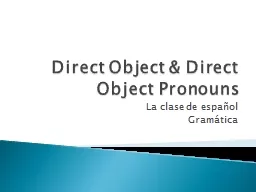PPT-Double Object Pronouns We have looked at both
Author : partysilly | Published Date : 2020-06-18
Direct and Indirect Object Pronouns and learned that we place them either directly before a conjugated verb or attach them to an infinitive But what happens
Presentation Embed Code
Download Presentation
Download Presentation The PPT/PDF document "Double Object Pronouns We have looked a..." is the property of its rightful owner. Permission is granted to download and print the materials on this website for personal, non-commercial use only, and to display it on your personal computer provided you do not modify the materials and that you retain all copyright notices contained in the materials. By downloading content from our website, you accept the terms of this agreement.
Double Object Pronouns We have looked at both : Transcript
Download Rules Of Document
"Double Object Pronouns We have looked at both "The content belongs to its owner. You may download and print it for personal use, without modification, and keep all copyright notices. By downloading, you agree to these terms.
Related Documents














